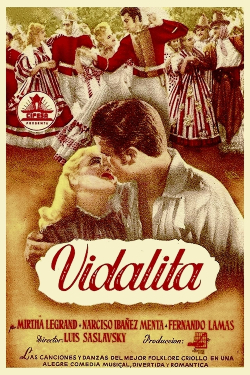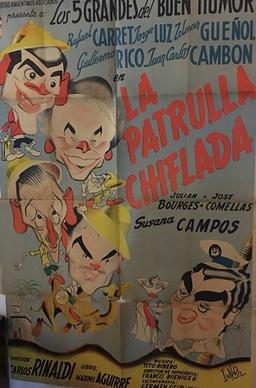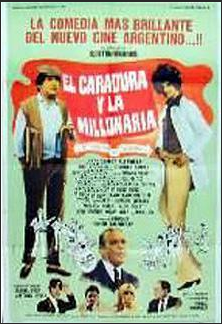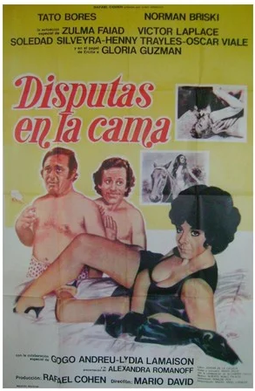
El Amor infiel is a 1974 Argentine romantic drama film directed by Mario David, who also wrote the script, which is based on a novel by María Angélica Bosco. It stars Zulma Faiad, Arturo Puig, Elena Sedova and Antonio Grimau. Víctor Proncet composed the soundtrack.

The Newsie and the Lady is a 1938 Argentine comedy film directed and written by Luis César Amadori.

Elvira Fernández, vendedora de tiendas is a 1942 Argentine comedy film directed by Manuel Romero. It stars Paulina Singerman, Juan Carlos Thorry, Tito Lusiardo and Sofía Bozán. The film is about the daughter of a millionaire store owner, who organizes a worker strike.

Vidalita is a 1949 Argentine comedy film directed and co-written by Luis Saslavsky and produced by Emelco. Considered transgressive for the time, it stars Mirtha Legrand as the title character, a girl who cross-dresses as a gaucho to be able to take charge of her grandfather's estate. Fernando Lamas stars as the captain of the fort, who falls in love with Legrand's character "to the point that he is willing to marry her without knowing if she is a man or a woman".

El Gaucho y el diablo is a 1952 Argentine black-and-white Western drama film directed by Ernesto Remani, based on a script by José María Fernández Unsain, who adapted it from the 1891 short story "The Bottle Imp", by Robert Louis Stevenson. The film stars Juan José Míguez, Elisa Galvé, Francisco Martínez Allende, and Elina Colomer.

La Patrulla chiflada is a 1952 Argentine adventure comedy film set in Africa, directed by Carlos Rinaldi and featuring the Los Cinco Grandes del Buen Humor group of comic actors. It stars Rafael Carret, Jorge Luz, Zelmar Gueñol, Guillermo Rico and Juan Carlos Cambón.

Rhythm, Love and Mischief is an 1955 Argentine musical (tango) comedy film directed by Enrique Carreras and written by Manuel Barberá. It stars Alberto Castillo, Amelita Vargas, Alfredo Barbieri and Francisco Álvarez and was released on 2 March 1958.

School of Mermaids and Sharks is a 1955 Argentine film directed by Enrique Carreras and starring Amelia Vargas, Alfredo Barbieri, Esteban Serrador and Leonor Rinaldi. The film was released on 4 August 1955. Enrique Carreras remade the film in 1982 under the title Los fierecillos indomables, starring Alberto Olmedo and Jorge Porcel in the lead roles.

Las furias is a 1960 Argentine drama film directed by Vlasta Lah, based on the 1950 play of the same name by Enrique Suárez de Deza. The first Argentine sound film directed by a woman, it was the directorial debut for Lah, who became the only woman film director in 1960s Latin America. Its cast is almost exclusively female, starring Mecha Ortiz, Olga Zubarry, Aída Luz, Alba Mujica and Elsa Daniel as characters whose name are not presented, being introduced as "the Mother", "the Lover", "the Wife", "the Sister" and "the Daughter", respectively.

El Caradura y la millonaria, also known as No estoy enamorada de tí, pero te quiero. is a 1971 Argentine comedy film directed by Enrique Cahen Salaberry. It was one of several films by Cahen Salaberry after his return from Spain to Argentine cinema in the 1960s. The screenplay was written by Luis Cesar Amadori and Antonio Botta. It is a remake of the 1938 film El canillita y la dama. The film premiered on 6 March 1971, and starred Juan Carlos Altavista and María Vaner, with Vaner performing her own songs.

Disputas en la cama, also known as Los divorciados, is a 1972 Argentine sex comedy film directed by Mario David. It stars Tato Bores, Norman Briski, Zulma Faiad, Víctor Laplace and Soledad Silveyra. A preview function with 250 guests for the film was suspended by the Qualification Body, which objected to scenes with Soledad Silveyra and Alejandra Romanof. Upon release on 11 May 1972, the film was largely panned by critics but was a box office success.
Juegos de verano is a 1973 Argentine erotic film directed by Juan Antonio Serna and starring Linda Peretz and Ricardo Morán.

Los golpes bajos is a 1974 Argentine film directed by Mario Sábato. It is a film about boxing, inspired by José María Gatica. Shot in Eastmancolor, Sabato wrote the script in collaboration with Mario Mactas. The film stars Aldo Barbero, Héctor Alterio, Walter Vidarte and Ana María Picchio.

El Grito de Celina is a 1983 Argentine romantic drama film directed by Mario David, who also wrote the script, which is based on a short story by Bernardo Kordon. It stars María Rosa Gallo, Selva Alemán, Miguel Ángel Solá and María Vaner. Víctor Proncet composed the soundtrack. The film was shot in 1975, but it didn't premiere until May 1983 due to military government disapproval and censorship at the time.
La Rabona is a 1979 Argentine comedy film directed by Mario David. It stars Alberto Closas, Claudia Cárpena, and Perla Santalla. The screenplay was written by the director Mario David, working in collaboration with Isaac Aisemberg. Atilio Stampone composed the soundtrack.

La rubia del camino is a 1938 Argentine romantic comedy written and directed by Manuel Romero. Actress Paulina Singerman made her debut in the film.

Las seis suegras de Barba Azul is a 1945 black and white Argentine comedy film directed by Carlos Hugo Christensen.
Aurelia Del Carmen Guarini is an Argentine anthropologist, teacher, film director, and film producer specializing in anthropological documentary films. She teaches visual anthropology and directs documentaries in Argentina and in Cuba. She serves on the documentary projects' evaluation committee at the National Institute of Cinema and Audiovisual Arts and participates in Cine Ojo projects.
Mario David was an Argentine film director and screenwriter. He directed and wrote 12 films between 1971 and 1996.

Vlasta Giulia Lah Rocchi, known professionally as Vlasta Lah, was the first woman director of sound films in Argentine cinema, as well as the only woman filmmaker in Latin America in the 1960s. Before her, the only women filmmakers in the country worked during the silent era in the 1910s and early 1920s, before the industrial development of Argentine cinema.
















